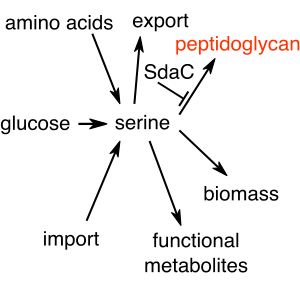Abstract
The amino acid serine, despite its diverse metabolic roles, can become toxic when present in excess. Indeed, many bacteria rapidly deaminate exogenously supplied serine into pyruvate and ammonia, even at the expense of biomass production. Here we report a surprising case in which endogenously produced serine must be detoxified in order for the bacterium Escherichia coli to survive. Specifically, we show that E. coli cells lacking the sdaCB operon, which encodes a serine transporter and a serine deaminase, lyse upon glucose depletion when serine is absent from the growth medium. Lysis can be prevented by omission of glycine or by inhibition of the glycine cleavage system, suggesting that activation of glycine catabolism upon glucose depletion causes a transient increase in intracellular serine levels. Heterologous expression of the serine transporter SdaC is sufficient to prevent lysis, indicating a dominant role for serine export, rather than deamination, in mitigating serine toxicity. Since lysis can be modulated by altering alanine availability, we further propose that mis-incorporation of serine instead of alanine into peptidoglycan crosslinks is the cause of lysis. Together, our results reveal that SdaC-mediated detoxification of intracellularly produced serine plays a protective role during sudden shifts in nutrient availability in bacteria.
